
BBC Sky at Night Magazine
BINOCULAR TOUR
Discover a stick man flexing his biceps, a golden giant and the sublime Double Cluster
2 min |
August 2025

BBC Sky at Night Magazine
MOONWATCH
August's top lunar feature to observe
2 min |
August 2025

BBC Sky at Night Magazine
THE BIG THREE
The top sights to observe or image this month
4 min |
August 2025

BBC Sky at Night Magazine
DEEP-SKY TOUR
Faint Camelopardalis is hiding some tricky-to-spot deep-sky gems. Can you find all six?
3 min |
August 2025

BBC Sky at Night Magazine
Dark matter
The mysterious force we can't see... and astronomers can’t even agree is there
3 min |
August 2025

BBC Sky at Night Magazine
Track and measure sunspots
How to find, follow and analyse these dynamic features on our ever-changing Sun
3 min |
August 2025

BBC Sky at Night Magazine
ZWO ASI585MM Pro USB 3.0 cooled mono camera
Fast for planets, cooled for deep sky - and all at an affordable price
4 min |
August 2025

BBC Sky at Night Magazine
Pegasus Astro NYX-88 harmonic gear mount
This sturdy yet light mount delivers near-flawless, reliable, on-the-button accuracy
4 min |
August 2025

BBC Sky at Night Magazine
Showcasing satellites
A timelapse composite that reveals our crowded skies
3 min |
August 2025

BBC Sky at Night Magazine
Q&A WITH AN ASTROBIOLOGIST
Scientists have detected the longest organic molecules on Mars to date, a major leap forward in the search for life on the Red Planet
3 min |
August 2025

BBC Sky at Night Magazine
THE DARK CHAMAELEON
A closer look at a star factory cloaked in shadow on Earth's doorstep
2 min |
August 2025

BBC Sky at Night Magazine
The Royal Observatory Greenwich An untold history
As it celebrates its 350th anniversary, Emily Winterburn uncovers some of the hidden figures - from instrument-makers to YouTubers - behind one of the world's earliest official astronomy institutions
8 min |
August 2025

BBC Sky at Night Magazine
From canals to Curiosity The search for life on Mars
Mars has long ignited our imagination. Ben Evans traces the history of our quest for life on the fourth rock from the Sun
8 min |
August 2025

BBC Sky at Night Magazine
INSIDE THE SKY AT NIGHT
July marks a milestone for Chris Lintott - 25 years appearing on The Sky at Night. Here he reflects on cosmic discoveries and standout moments from his time on the show
3 min |
August 2025

BBC Sky at Night Magazine
Moonlight Perseids
The Moon will be a nuisance, but you can still get great meteor shots - here's how
4 min |
August 2025

BBC Sky at Night Magazine
THE PLANETS
Our celestial neighbourhood in August
3 min |
August 2025

BBC Sky at Night Magazine
Meteor hunters unite!
Meteor showers are always awe-inspiring, but now amateur data is helping us track, understand and even protect ourselves from these cosmic invaders. Mark McIntyre explains how you can join in
7 min |
August 2025
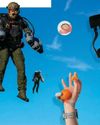
BBC Science Focus
TECH TO TURN YOU INTO A CYBORG
A future where humans can lift incredible weights, see in the dark and fly sounds far-fetched, but actually... it's already here
3 min |
July 2025

BBC Science Focus
HOW TO BEAT THE AFTERNOON SLUMP
Recent research is revealing what's causing your post-lunch lethargy, why it stalls your productivity and the best ways to get your brain back into gear
8 min |
July 2025

BBC Science Focus
Does having a 'dog baby' make us happier than having a human baby?
While fertility rates across the world are falling, more and more of us are choosing to parent pooches
5 min |
July 2025

BBC Science Focus
EDITOR'S PICKS...
This month's smartest tech
2 min |
July 2025
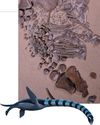
BBC Science Focus
Decades-old sea monster mystery solved
Discovered in the 80s, the creature was unlike anything scientists had seen before
1 min |
July 2025

BBC Science Focus
Should my next boss be an artificial intelligence?
Humans are emotional, irrational and biased. Hardly an ideal recipe for running a company. So would an AI do a better job?
5 min |
July 2025
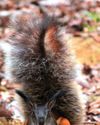
BBC Science Focus
THE TUFTED GROUND SQUIRREL
You know when you stare at cute things for too long and they start to look creepy? I'm thinking garden gnomes, baby dolls, any child in a princess outfit and all cats. Well, now there's another one to add to the list.
2 min |
July 2025

BBC Science Focus
WHAT OUR ANCESTORS ACTUALLY ATE
Our hunter-gatherer forebears weren't the carnivorous cavemen we once thought. Which makes trying to build a diet based on what they ate not only unwise, but practically impossible
9 min |
July 2025

BBC Science Focus
Only one country in the world produces all the food it needs
All other countries are vulnerable to the effects of war, natural disasters and trade disputes on their food supply
2 min |
July 2025
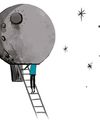
BBC Science Focus
Research team 'puzzled' by strange activity inside the Moon
Scientists may have discovered why the two sides of the Moon look so different
1 min |
July 2025

BBC Science Focus
Common vitamin supplement could slow ageing
Vitamin D may protect cells from age-related decline
1 min |
July 2025
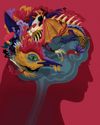
BBC Science Focus
WE NEED TO TALK ABOUT INTRUSIVE THOUGHTS AND HOW TO HANDLE THEM
Disturbing ideas occur to all of us. But what happens if you're struggling to let those thoughts go?
8 min |
July 2025
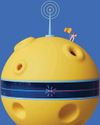
BBC Science Focus
WHAT IF WE BUILT A SUPER-COLLIDER AROUND THE MOON?
Somewhat surprisingly, scientists and engineers have indeed considered putting a super-collider on the Moon. Such a machine would operate just like the Large Hadron Collider (LHC), at CERN, near Geneva, the world's largest and highest-energy particle accelerator. These 'atom-smashers' create two particle beams travelling in opposite directions through ultrahigh-vacuum rings. Strong superconducting electromagnets accelerate the beams to almost the speed of light. The beams are then allowed to collide in one of the detector instruments, creating a cascade of other particles which are then measured and analysed.
1 min |
